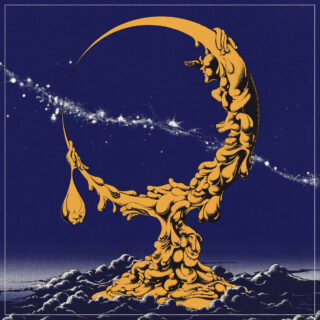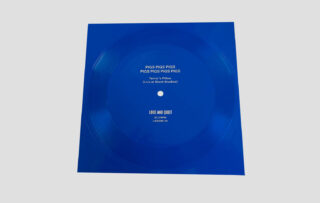Land of Sleeper has been one of the most relaxed recording experiences for the band so far. Written over a week-long retreat in Wales and recorded in the comfortable surrounds of Blank, it’s probably the least pressured Pigs have ever been. Somehow though, the album has turned out dark. It’s not just the intense doom of previous album Viscerals, but a weird, almost creeping, horror movie style of darkness. “The press release for the album starts with the Nightmare On Elm Street 3 quote for a reason,” says Baty, noting that while Land of Sleeper is not a concept album, dreams and sleep are references throughout. “There’re also recurring references to cycles,” he adds, “both beginning and ending – birth and regeneration, death and decay.”
Pigs have never been a political band and have never set out to reflect the state of the nation, but psychologically it’s impossible to cut yourself off completely from world events. The reality is that in some ways, the turmoil of the last couple of years has probably manifested itself in this record.
“You see, I’m not totally sold on that,” explains Sykes, as we discuss the reasons for the band’s darker sound. “I think after such a comfortable experience recording the thing, we subconsciously wanted to make sure that the doom was still in there. I can remember being in Wales and being worried that this is going to turn out too nice. I was literally having anxiety about not having anxiety, if that makes sense.
“I also struggled with that,” nods Baty. “The recording process, it was going so fucking well, everyone was completely nailing it, we were going ahead of schedule, and the atmosphere was so relaxed. It sounded great. And that was worrying me. I was like, well, where’s the spanner in the works here? I was freaking out because of the complete lack of anxiety – it was absolutely insane. I was worried that we were being complacent and it was only until I got my turn to do the vocals that I remember a very distinct moment where I was like, Fuck. Like, I’m back. I’m doing this, and I think I can do this. Dare I say, I’m actually good at this.”

It’s weird to think that a band who sound as well-drilled as Pigs are still on a learning curve. Admitting that they seldom listen back to their older work, the group are still keen to point out their strong sense of progression from album to album and how much they still have to learn as a band. The various members talk excitedly about the other projects they work on, from Rubber Oh, Grant’s upbeat, wonky pop outfit, to the sweeping electronica found on McKenzie’s solo project, Dextro, the group are unafraid to travel off down all sorts of creative avenues and musical alleyways. Richard Dawson is also an important touchpoint for the band, with Grant and Baty working closely with the local folk singer. Holding a position between mate, inspirational figure and pace-setter for the band, Grant explains the odd sense of synchronisation the group share with him. “Before [Pigs second album] King of Cowards, I’d just finished Peasant with Richard, and before Viscerals we’d finished 2020, and before Land of Sleeper we’d just finished The Ruby Chord,” he tells me. “To me, it’s always a humbling experience when you get to watch someone that’s as fucking good as that do what they do. You feel like a child, and in a lot of ways that’s a very healthy place to be.”
That final statement strikes me as a bit strange. If there has been one theme that’s surfaced over our afternoon together, it’s that whenever Pigs take a second to look back, they almost seem uncomfortable with what they’ve accomplished. After all, this is a band who have released three, soon to be four, critically acclaimed records, feature high up on the bills at festivals and sell out gigs regularly, yet there still seems to be some reluctance to accept that they’re successful. “Personally, it gets worse the more pressure we’re under,” groans Sykes when I ask where this imposter syndrome might be coming from. “The tight deadlines, the more people we have to play for, the worse it is. I’m like, ‘I can’t play guitar, but here I am, so here I go..’”
“Sometimes I reckon I hide behind it,” says Grant. “I honestly don’t think I’m all that as a musician and I’m using imposter syndrome to convince myself that I am. Working in a studio, man, every fucking day I get artists coming through and I’m constantly blown away by the talent of some people. I’m just like, man. And I’m also under no illusions because I can record myself and hear myself and just have it in a speaker, whether it’s vocals or guitar or whatever, and hold it against that. I know that, personally, my strengths lie in production. But as a musician, I’m not pulling all the tricks in the book.”
Thinking for a second, Baty has a more philosophical take. “Part of this attitude fuels us in a way, especially in a live setting, because you’re kind of full of these thoughts of inadequacy, you know that you’ve got to go onto the stage and you’ve got to do everything. Just release absolutely every grain of energy that you have to make that fulfilling experience for yourself and for everyone. Watching most gigs, we’re almost crawling off the stage because of how much we’ve exerted. It’s cliché to say it, but everything is left on the stage. There is no more. We don’t do encores, and for a reason. It is all there.”
“It keeps you hungry – in a good way,” adds Sykes. “When it comes to music, I always overshoot. I always want to do something out of the box and then worry for the next two months that I can never play it again. That’s where the energy comes from. It’s like I am never fully prepared. I can’t play what I’ve written half of the time. And it’s that excitement that keeps me in a lot of time”
Our short tour has come to an end and we return our cups and head back out onto the street to find, in our absence, that night has fallen and people are making their way home from work. As the band say their goodbyes and organise their next meet-up, the sound of an a-board being scraped into the street pulls my attention to a pub down the road. “You know what? We filmed our first video in that pub,” says McKenzie, who’s seen the same thing. “We needed to get something done quickly and we just went in there and asked. They were like, ‘No problem; when do you want to do it?’
“That’s the great thing about Newcastle, people want each other to do well. There’s so little bitterness; so little competitiveness. I think the reason why we’ve all stayed here is that, ultimately, it’s a pretty supportive place. People just want to see you do well.”
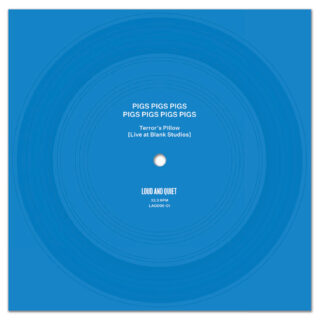 Terror’s Pillow – Live at Blank Studios
Terror’s Pillow – Live at Blank Studios
Launching our new limited edition flex disc series, Loud And Quiet subscribers receive an exclusive live session version of new Land of Sleepers song ‘Terror’s Pillow’ with their copy of the magazine this month, recorded at Blank Studios. Sam Grant talks us through the song, and this special version of it, below:
“I was really excited about this waltzy, almost classical feel it had going on, and was constantly trying to push that element more in the writing and production, hopefully giving it a less conventional rock/metal vibe. I like to think it has the air of an unreleased bonus track from Holst’s The Planets – though this is more an homage to the massive asteroid currently winging its way to Earth. Doing it as a live session also gave us the opportunity to really pull the tempo on it as well, giving it an alternative mood to the album version. The nature of the track really suits both approaches, but for differing reasons. This live version, in being slower, gets to be something a little more weighty and crushing – a bit more menacing. So I’m really pleased this one gets to exist too.”
Subscribe by 15 March 2023 to receive the Pigs flexi disc with issue 157 of the magazine




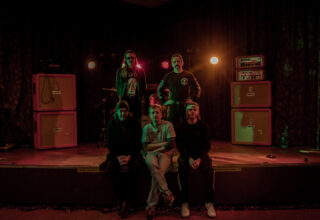
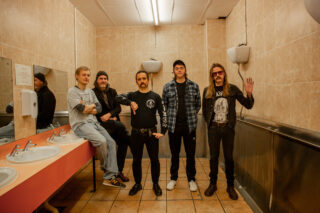
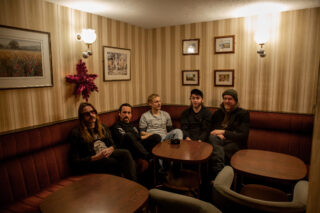
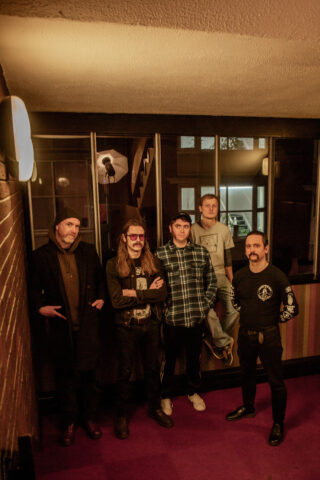
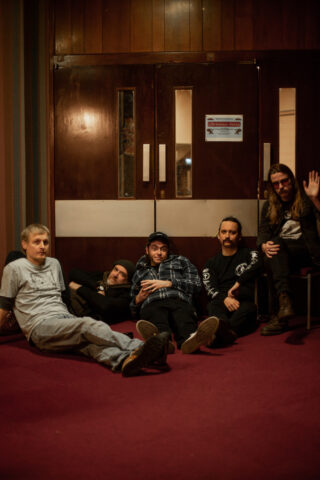

 Terror’s Pillow – Live at Blank Studios
Terror’s Pillow – Live at Blank Studios